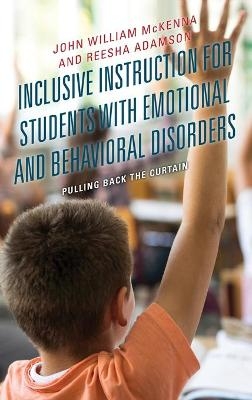
Inclusive Instruction for Students with Emotional and Behavioral Disorders
Lexington Books (Verlag)
978-1-4985-9642-8 (ISBN)
Inclusive Instruction and Students with Emotional and Behavioral Disorders: Pulling Back the Curtain discusses the challenges of the increasingly common practice of educating students with disabilities in general education classrooms, citing that these challenges are often due to the fast pace of instruction, the emphasis on advanced concepts and skills that align with college and career-readiness standards, and the presence of poorly developed prerequisite skills that are necessary for traditional academic success. This book posits that these challenges are particularly salient to the education of students receiving special education services for emotional disturbance (ED), as students with ED have pervasive learning and behavioral difficulties that are often resistant to typical instruction and intervention. Contributors argue that despite increased awareness and application of inclusive mindsets, school and post-school outcomes for this student population continue to be a national concern in the United States. In this book, contributors provide recommendations for improving the manner in which schools serve this student population through inclusive measures, along with resources for administrators, teachers, and parents/guardians, that emphasize the provision of a free appropriate public education for students with ED. Scholars of education, disability studies, and psychology will find this book particularly useful.
John William McKenna is associate professor of moderate disabilities and an affiliate of the Center for Autism Research and Education (CARE) at the University of Massachusetts Lowell. Reesha Adamson is associate professor at Missouri State University.
Chapter 1: Introduction
Chapter 2: Free Appropriate Public Education: The Foundation of Special Education
Chapter 3: Practices for Improving Academic Achievement: Lessons Learned and Limitations of Intervention Research
Chapter 4: Explicit Vocabulary Instruction in the Inclusive Classroom
Chapter 5: Use of Graphic Organizers to Improve Academic Content Acquisition
Chapter 6: Writing Instructional Strategies for Elementary Age Students with Emotional and Behavioral Disabilities, by Robai Werunga
Chapter 7: Inclusive Mathematics Practices for Students with Emotional Disturbance, by Jessica Nelson
Chapter 8: Differentiation of Instructions for Students with Emotional Disturbance
Chapter 9: Using Technology to Support Inclusive Instruction for Students with Emotional Disturbance
Chapter 10: Use of Daily Progress Reports and Behavioral Contracts to Support Inclusive Education
Chapter 11: Function-based Thinking to Support Inclusive Instruction
Chapter 12: Trauma Informed Support: Considerations for Students with ED Who Have Experienced Trauma, by Felicity Post
Chapter 13: The False Promise of Learning Styles Based Instruction, by John William McKenna, Reesha Adamson, and Eliza Bobek
Chapter 14: Progress Monitoring in the Inclusive Classroom
Chapter 15: Collaboration in Inclusive Instruction for Students with ED
Chapter 16: Abandoning Readiness, by Maria Kolbe, Inclusion Facilitator
Chapter 17: Closing Commentary
References
About the Authors
About the Contributors
| Erscheinungsdatum | 10.05.2021 |
|---|---|
| Co-Autor | Reesha Adamson, Eliza Bobek, Maria Kolbe |
| Verlagsort | Lanham, MD |
| Sprache | englisch |
| Maße | 161 x 230 mm |
| Gewicht | 526 g |
| Themenwelt | Sozialwissenschaften ► Pädagogik ► Didaktik |
| Sozialwissenschaften ► Pädagogik ► Sonder-, Heil- und Förderpädagogik | |
| ISBN-10 | 1-4985-9642-8 / 1498596428 |
| ISBN-13 | 978-1-4985-9642-8 / 9781498596428 |
| Zustand | Neuware |
| Informationen gemäß Produktsicherheitsverordnung (GPSR) | |
| Haben Sie eine Frage zum Produkt? |
aus dem Bereich


